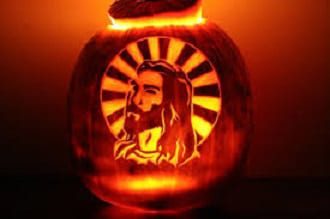One Sunday, toward the end of a particularly lively and deep seminar with my “Living Stones” adult Christian education group after the morning service, I asked the group “so what makes us think that we are anything special, that Episcopalians have a better angle on God than anyone else? What makes us think that our way is any better than anyone else’s, Christian or otherwise, other than that it is our way?”
Very quickly one person replied “it isn’t any better.” And everyone else in the group of fifteen or so proceeded to affirm this answer, either with positive head nods or similar verbal replies. We are all seekers after God, but other than the matter of “comfort zone,” there is nothing that makes our chosen framework for that search any better than the way of other Christian group, or the Muslim, Jewish, Buddhist, Hindu, atheist, agnostic, or any other way for that matter. Oh my. So it has come to this.

Earlier in the discussion I had told the group the story of a conversation that Jeanne and I had with our good friends Michael and Suzy a few years ago as we traveled with them and their boys to some central Florida attraction. I don’t remember any of the details of the conversation other than something Michael said. He’s a Catholic theologian, and offered that “I fully expect to see my Muslim and Jewish brothers and sisters in heaven.” No extra ecclesiam nulla salus (“outside the Church there is no salvation”) for him. Those would have been burning-at-the-stake words for any Catholic theologian not many centuries ago; truth be told, the Baptists I grew up with would not only have wanted to virtually burn Michael (Protestants have done such things in the past), but would also have considered Michael as on the fast track to perdition simply because he is Catholic.
I agreed with Michael, and had for some time, but to hear my Episcopal friends take his broad ecumenism without blinking as a “no brainer” was revealing. I had mentioned toward the beginning of seminar that my own spiritual journey and process of growth over the past few years has, among other things, been a slow process of putting some very loud and intrusive ghosts to rest. But by the end of seminar I could still faintly hear their corpses rolling over in their graves. I could also hear, more distinctly, different ghosts altogether. The ghosts of Jesus past.
The fundamentalist, evangelical Baptists I grew up with had their own version of extra ecclesiam nulla salus, although no one in the group knew Latin. We didn’t need to, because we knew the King James Bible backwards and forwards. The Bible is littered with verses that we took to mean that it is difficult to get into heaven, and those who don’t find the way are going to hell.
I am the way, the truth and the life. No one comes to the Father but by me.
There is no other name under heaven, given among men, whereby we must be saved.
Strait is the gate, and narrow is the way, which leadeth unto life, and few there be that find it.
And we sang hymns and contemporary tunes every Sunday that doubled down on this exclusivity.
What can wash away my sins? Nothing but the blood of Jesus.
Jesus died so I might live.
These all lead to Fire-insurance policy Jesus, a Jesus whose whole purpose was to provide a way of escaping the wrath of a pissed-off God the Father and the eternal flames of hell. And, not surprisingly, we were convinced that our small group, and the few other groups who believed exactly as we did, had nailed it. We possessed the one effective policy—and all of the other policies were pretenders and fakes that would have no cash value on judgment day.
I was taught that Jesus was fully human and fully divine—a doctrine that has confounded and confused the greatest philosophical and theological minds for the past two millennia—but in reality, it was divine Jesus who got all the play. I wanted to know what Jesus was like as a kid my age, but all I got was one story from the gospels about Jesus from age two to age thirty, a story in which the twelve-year old Jesus is polishing his halo rather than acting as twelve-year old humans do. Grown-up Jesus never laughed, never had fun, was always serious, was always doing things that real human beings don’t do (like performing miracles and rising from the dead), wasn’t married, didn’t have kids—very difficult to relate to on a human level.
 So I came to think that despite the doctrine, Jesus in truth was a divine being pretending to be human for a certain amount of time, just so the human beings around him would be a little bit more comfortable. Jesus wearing a human Halloween mask was unapproachable, impossible to resonate with, and yet was the person in whom I was supposed to trust and believe, the guy who was my only ticket to eternal happiness.
So I came to think that despite the doctrine, Jesus in truth was a divine being pretending to be human for a certain amount of time, just so the human beings around him would be a little bit more comfortable. Jesus wearing a human Halloween mask was unapproachable, impossible to resonate with, and yet was the person in whom I was supposed to trust and believe, the guy who was my only ticket to eternal happiness.
I stopped believing in Halloween Jesus a long time ago, and I blame him for my immediate attraction as an adult to stories in which Jesus is acting like a normal, limited human being rather than God in the Flesh or the Savior of the World. If the Incarnation means anything, it means that God became meat (carne = flesh, meat). That crass equivalence reminds me that this is not a story of an ethereal and unapproachable bridge to an unknown God, but rather a story of divine love so extreme that all of the trappings of divinity are dropped in exchange for becoming human. It makes it a lot more possible to believe in a continuing Incarnation—God in us—if the model and paradigm was just like us and still was a worthy bearer of the divine.
Putting a stake through the heart of Fire-Insurance Policy Jesus was a lot more difficult and has taken a lot more time. He’s like a vampire—every time I think he’s done for, he pops up somewhere else in a slightly different form. But putting Halloween Jesus in the grave has helped. What is the Christian faith really about? Escape from eternal damnation or a transformed life and working to establish God’s kingdom on earth now? With the help of mentors, conversations and books over the past several years I have strongly landed on the latter option. So much so that I can truthfully say that I don’t know exactly what will happen when I die, and it doesn’t matter.
I am not a God-believer because it guarantees me an attractive afterlife. I believe in God because it is the only framework within which I find the empowerment and direction to avoid cynicism and despair. And, sure enough, it is not only Christianity that provides such a framework. I am a Christian because it is my history, my heritage, my home. But I can imagine a Muslim, a Jew, or any other God-believer finding similar strength and empowerment in their own histories and traditions (not so sure about the atheists, though—food for thought!). The Living Stoner who said that there is nothing special or better about our (my) way of doing things was absolutely right—as Marcus Borg writes, “there is a cloud of witnesses, Christian and non-Christian, for whom God, the sacred, is real, an element of experience.” This has nothing to do with doctrine, dogma, or intellectual affirmation. But the ghosts of Jesus past are not happy.













